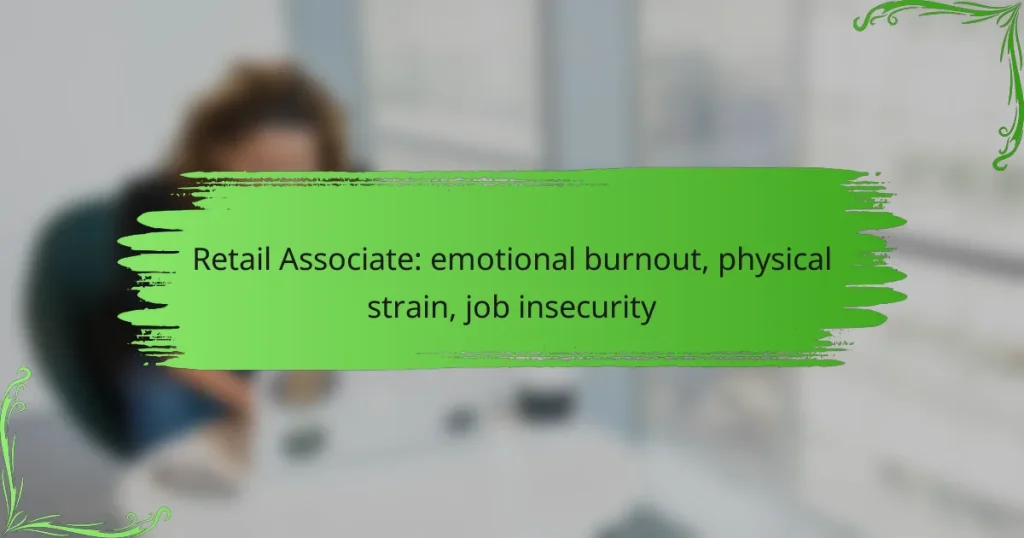Retail associates often face significant challenges, including emotional burnout, physical strain, and job insecurity. These factors can impact their overall well-being and job performance. By adopting effective strategies for mental health, physical comfort, and career resilience, associates can better navigate the demands of their roles and foster a more sustainable work environment.

How can retail associates manage emotional burnout?
Retail associates can manage emotional burnout by implementing strategies that promote mental well-being and resilience. Effective techniques include mindfulness practices, support groups, time management, and professional counseling.
Mindfulness practices
Mindfulness practices help retail associates stay present and reduce stress. Techniques such as deep breathing, meditation, and short breaks for reflection can enhance focus and emotional regulation. Even a few minutes of mindfulness each day can significantly improve mood and decrease feelings of burnout.
Consider incorporating mindfulness into daily routines. For example, taking a five-minute break to focus on breathing or practicing gratitude can help reset emotional states during busy shifts.
Support groups
Joining support groups allows retail associates to share experiences and coping strategies with peers facing similar challenges. These groups can be found locally or online, providing a safe space to discuss feelings of burnout and job-related stress.
Participating in regular meetings fosters a sense of community and belonging, which can alleviate feelings of isolation. Look for groups that focus on retail work or general stress management to find the right fit.
Time management techniques
Effective time management is crucial for reducing emotional strain in retail jobs. Prioritizing tasks and setting realistic goals can help associates manage their workload more efficiently. Techniques like the Pomodoro Technique, which involves working in focused bursts followed by short breaks, can enhance productivity.
Creating a daily schedule that includes time for breaks and personal tasks can also prevent overwhelm. Use tools like planners or digital apps to keep track of responsibilities and deadlines.
Professional counseling
Seeking professional counseling can provide retail associates with tailored strategies to cope with emotional burnout. A licensed therapist can help identify underlying issues and develop coping mechanisms suited to individual needs.
Many employers offer Employee Assistance Programs (EAPs) that provide access to counseling services at little to no cost. Taking advantage of these resources can lead to significant improvements in mental health and job satisfaction.

What are effective strategies to reduce physical strain for retail associates?
To effectively reduce physical strain for retail associates, implementing proper ergonomics, regular stretching exercises, suitable footwear, and structured break schedules is essential. These strategies help minimize discomfort and enhance overall well-being in a demanding work environment.
Proper ergonomics
Proper ergonomics involves arranging workspaces and tasks to fit the physical capabilities of retail associates. This includes adjusting shelving heights, using tools that reduce bending or reaching, and maintaining a neutral posture while lifting. Training staff on ergonomic principles can significantly decrease the risk of musculoskeletal injuries.
Employers should consider ergonomic assessments to identify potential hazards and make necessary adjustments. Simple changes, such as using carts for heavy items or providing anti-fatigue mats, can lead to substantial improvements in comfort and productivity.
Stretching exercises
Incorporating stretching exercises into daily routines can alleviate muscle tension and improve flexibility for retail associates. Simple stretches targeting the back, shoulders, and legs can be performed during breaks or downtime. Holding each stretch for 15-30 seconds can help maintain mobility and reduce discomfort.
Encouraging staff to engage in brief stretching sessions every couple of hours can enhance circulation and prevent stiffness. Group stretching sessions can also foster team bonding and create a supportive work environment.
Footwear recommendations
Choosing the right footwear is crucial for reducing physical strain in retail settings. Shoes should provide adequate arch support, cushioning, and a non-slip sole to prevent slips and falls. Retail associates should opt for shoes designed for long hours of standing, such as those with shock-absorbing materials.
It is advisable to avoid high heels or overly flat shoes, as these can lead to foot pain and fatigue. Retailers may consider implementing a dress code that emphasizes comfort and safety in footwear choices.
Break schedules
Establishing structured break schedules is vital for minimizing physical strain on retail associates. Regular breaks allow employees to rest, hydrate, and stretch, which can help prevent fatigue and maintain energy levels throughout their shifts. A common practice is to schedule a 10-15 minute break for every 2 hours of work.
Employers should encourage associates to take their breaks away from the sales floor to fully recharge. Flexibility in break times can also accommodate peak hours, ensuring that staff can manage their workload while prioritizing their health.

How can retail associates cope with job insecurity?
Retail associates can cope with job insecurity by actively seeking resources that enhance their skills, expand their professional networks, and improve their financial stability. Utilizing these strategies can provide a sense of control and increase employability in a fluctuating job market.
Skill development programs
Skill development programs are essential for retail associates looking to enhance their employability. These programs often focus on areas such as customer service, sales techniques, and inventory management, which are crucial in retail settings. Many community colleges and online platforms offer affordable courses that can help associates gain certifications or new skills.
Associates should consider enrolling in programs that align with their career goals. For instance, a course in digital marketing can be beneficial for those looking to transition into e-commerce roles. Regularly updating skills can make a significant difference in job security.
Networking opportunities
Networking opportunities allow retail associates to connect with industry professionals and potential employers. Joining local retail associations or attending industry conferences can provide valuable contacts and insights into job openings. Online platforms like LinkedIn also offer groups specifically for retail professionals.
Associates should actively participate in discussions and share their experiences to build relationships. Networking can lead to mentorship opportunities, which can further enhance career growth and job security.
Financial planning resources
Financial planning resources are crucial for retail associates facing job insecurity. Creating a budget and understanding personal finance can help manage income fluctuations. Many organizations offer free workshops on budgeting and saving, which can be beneficial for associates looking to stabilize their finances.
Associates should consider setting up an emergency fund that covers at least three to six months of living expenses. This financial cushion can provide peace of mind during uncertain times and help navigate periods of unemployment without significant stress.

What are the signs of emotional burnout in retail associates?
Emotional burnout in retail associates can manifest through various signs, indicating a state of mental, emotional, and physical exhaustion. Recognizing these signs early can help in addressing the issue before it escalates.
Increased irritability
Increased irritability is a common sign of emotional burnout among retail associates. This can manifest as frustration over minor issues, difficulty in managing customer interactions, or a short temper with colleagues. Such irritability can lead to a toxic work environment and affect team dynamics.
To combat irritability, associates should practice stress management techniques such as deep breathing or taking short breaks during shifts. Regularly reflecting on positive interactions can also help shift focus away from negativity.
Decreased job satisfaction
A noticeable decrease in job satisfaction is another key indicator of emotional burnout. Retail associates may feel disengaged from their work, leading to a lack of motivation and enthusiasm. This can result in lower productivity and a diminished quality of customer service.
To improve job satisfaction, associates can seek opportunities for professional development or engage in open discussions with management about their concerns. Setting small, achievable goals can also help rekindle a sense of purpose in their roles.
Physical symptoms
Physical symptoms often accompany emotional burnout, including fatigue, headaches, and sleep disturbances. Retail associates may find themselves feeling constantly drained, which can impact their ability to perform tasks effectively. Chronic stress can also lead to more serious health issues over time.
To mitigate physical symptoms, it is essential for associates to prioritize self-care. This includes maintaining a balanced diet, getting regular exercise, and ensuring adequate sleep. Seeking support from colleagues or mental health professionals can also be beneficial in managing stress and its physical manifestations.

What role does management play in preventing burnout?
Management plays a crucial role in preventing burnout by fostering a supportive work environment and implementing effective strategies. By recognizing the signs of emotional and physical strain, leaders can take proactive steps to mitigate job insecurity and enhance employee well-being.
Recognizing signs of burnout
Management should be trained to identify early signs of burnout, such as decreased productivity, increased absenteeism, and emotional exhaustion among retail associates. Regular check-ins and open communication can help in recognizing these symptoms before they escalate.
Encouraging employees to share their feelings and experiences can create a culture of transparency. This can be achieved through anonymous surveys or one-on-one meetings, allowing management to gauge the overall morale and stress levels within the team.
Implementing support systems
Establishing support systems is essential for preventing burnout. Management can introduce employee assistance programs (EAPs) that provide mental health resources, counseling, and stress management workshops. These resources can help associates cope with the demands of their roles.
Additionally, flexible scheduling can alleviate physical strain by allowing employees to balance their work and personal lives better. Offering part-time options or adjustable shifts can help reduce the pressure on retail associates.
Encouraging work-life balance
Promoting a healthy work-life balance is vital in preventing burnout. Management should encourage employees to take regular breaks and utilize their vacation days. This not only helps recharge their energy but also fosters a more productive work environment.
Creating policies that respect personal time, such as limiting after-hours communication, can further support this balance. Retail associates who feel their personal lives are valued are more likely to remain engaged and committed to their work.
Providing training and development
Offering training and development opportunities can empower retail associates and reduce feelings of job insecurity. Management should invest in skill-building workshops and career advancement programs that help employees grow professionally.
By equipping associates with the necessary skills and knowledge, management can enhance their confidence and job satisfaction. This investment not only benefits the employees but also contributes to a more competent and motivated workforce.


